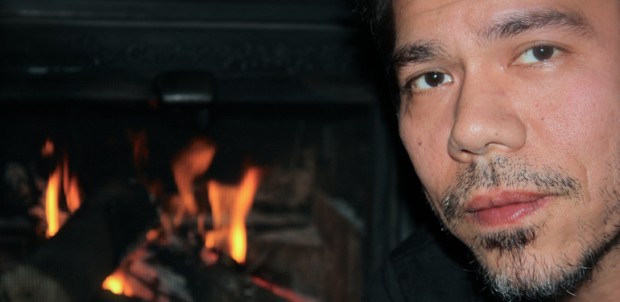Slint guitarist David Pajo has had an extraordinarily colourful career. Aside from spearheading the aforementioned Louisville post rock band’s genre-defining sound on the likes of their landmark 1991 album Spiderland, he has also released several albums under his own name, Papa M, Aerial and M, as well as playing with the likes of Zwan, Yeah Yeah Yeahs, Interpol, Tortoise, Royal Trux and innumerable other acts.
This week last month, Pajo attempted to take his own life, having posted a long, detailed suicide note on his blog. Against all the odds, he was saved just in time. The reaction from his many fans across the world was one of huge concern. Now very much on the road to recovery, he talks to Brian Coney about mental health, his own experience, what lies ahead and – the absolute aim of this piece – what he believes is necessary to tackle both thoughts of and the taboo surrounding talking about suicide.
Photo by Bonnie Parker
Hi David. A lot of people are extremely glad that you’re still with us. How are things with you at the minute?
This very minute I’m having a smoke on my front porch, sitting in the sun, listening to the birds and writing about this very moment. Life ain’t too shabby!
Certain things rapidly changed and came to a head for you last month. Looking back, is that period hazy or crystal clear?
It’s completely vivid. I replay some scenes often in my head, so I won’t forget. I need to write it all down so I can stop looping playback, you know? Nothing about it is foggy, even when I was unconscious during my suicide attempt. Crystal clear.
You posted a few different photos on your blog and Instagram hinting at your intention. In your heart of hearts, were those a so-called “cry for help”?
Absolutely not. Help was the last thing I wanted. When they were putting stitches in my neck in the ER the nurse asked, “Do you have anything to say?” I replied, “I wish I had died.” She was a bit taken aback but then said, “Well I’m glad you’re here.” I started crying very quietly as no one had said anything to me like that before.
I had the Suicide Hotline number saved as a speed dial in my phone for over a year but never called because I didn’t want to be talked out of anything – my mind was made up. My blog was supposed to be a way for people to know my side of the story. That’s all. I didn’t intend to be around for the aftermath.
On your blog, you recently said, “That time is 100% over and will never repeat itself, but it existed.” That really struck a chord with me because you’ve always struck me, and I assume many others, as being a shy, introverted but otherwise a happy and content person. Can you share your thoughts on how anyone – even the happiest and most content person – could be susceptible to what happened to you?
I’m very good at disguising my depression – up until the very end I was completely lucid. My ex was the only person who knew I was suicidal, for half a year she knew this, but never acknowledged what I was going through or tried to help. People need to be aware of what I can only call dangerous and untrue thoughts within themselves, i.e. “I had a good run but the time is now to call it quits,” “People will be saddened for a moment but ultimately the world is better off without me,” “I am ugly/an awful person etc,” “This is insurmountable and there’s no other way out of this situation,” “I refuse to live without (insert name here),” “I am alone” and so on. I have found all these thoughts to be completely false, but the rationale is so seductive it’s easy to get tunnel vision and close oneself off to any other exit. These thoughts should be red flags to anyone having them. The emotion needs to be removed and the thoughts examined thoroughly, you know? It took me going all the way into the thoughts and out the other side to be able to do this. I don’t recommend this. Get to them early before the thoughts propagate like cancer cells.
I also wholeheartedly agree with you saying it’s best not to dwell on things and that “jumping one obstacle at a time” is the best course of action. Where do you gain your motivation and strength at this time?
Honestly, there was such a massive outpouring of love and support by making my heart public that there was no way to avoid being empowered by it all. My family drew me in tighter than we’ve ever been. Thousands of emails and messages from friends and strangers came flooding in immediately, literally from the minute I posted it and attempted suicide.
The messages still come in. People sharing their own divorce/suicide/horror stories and I try my best to answer each and every one. That’s what got me focused on the most important thing: me and my healing. My children can only benefit from having a present and stable Daddy in their lives, not a dead one.
A lot more can be done to promote mental health awareness and support for people with suicidal thoughts. Northern Ireland, for example, has extremely worrying rates of suicide – especially amongst men. What more do you think can be done to change that, generally?
I believe depression and suicide should not be taboo. The media often talks about cancer, AIDS, and other terminal illnesses but depression and suicide rarely get any attention unless it’s unusual or a celebrity. We don’t talk about it amongst friends – we think it’s too morbid. But I’ve known more people who have died from suicide than any other illness. In my world, it’s a bigger problem than cancer. Yet it’s never talked about.
Also, people create opinions on suicide and never waver from it: “It’s a selfish act,” “Anyone who does that is crazy,” “They are weak,” “They just want attention,” “Only goths, freaks, and death-obsessed people commit suicide”. These are all false assumptions as well and I could go into each one but I’ll save that for another time. My point is, people create these stances based on fear – they don’t want to imagine the sheer hopelessness and despair that would drive a sane person to do that.
Organizations like www.livethroughthis.org are doing great things to provide a human face to what is otherwise just a statistic. What’s stunning is the wide variety of people from every walk of life who has attempted suicide.
What advice would you give to anyone who might be feeling certain thoughts or anxieties that possessed you during your experience?
Well, I mentioned that it’s important to beware the ‘dangerous and completely untrue thoughts’ above. But there are quite a few things you can do. Don’t internalize your darkness: pull them out of your head and dump them on every person you can trust with your feelings! Yes, just drop it on them. When you’re bummed, you don’t want to burden anyone with your darkness so you keep it all inside. Fuck that. If they love you, it’s not a burden. Dump it out, lay your cards on the table with people who will react with compassion and not hold it against you. Do this all the time. If it’s in your head, let it out. It’s like releasing a valve, all that pressure starts releasing. Every little bit helps. Don’t hold back.
Also, no problem is insurmountable. But you have to line them up and take them one at a time. Prepare for the worst, hope for the best.
And most importantly, chuck the fuckers who have proven themselves unworthy of your love. Vile, hateful people who make you feel awful about yourself – you don’t have time for that shit anymore. Just kick them to the curb. Why waste your love on someone who doesn’t deserve it? Seriously. I know we can’t control how we feel about someone. But these people will kill you if you let them and they honestly don’t give a flying fuck if you live or die. People change, sometimes they become enemies, and that’s okay.
Touching briefly on Slint, I figure some people will sense certain parallels between the dark fragility and hinting lyrics of certain songs (namely on ‘Washer’ and ‘Don, Aman’) and what’s recently happened to you. Is there a psychic association there somewhere?
Yeah, without giving away too much, I think it’s fair to say that all of us in Slint have suffered from severe anxiety and depression.
Looking ahead, what are your plans for the remainder of the year and beyond?
I’m mostly trying to get my life back on track dealing with nasty things like divorce warfare, child custody, visitation and support, living arrangements, character assassination, etc. But the urge to make music is slowly returning. I want to go on tour again, with a good band.
Has what happened to you altered how you either percieve yourself as a musician, in this exact moment of time, or your plans for create/perform music in 2015?
I lost all interest in making music. I lost all interest in listening to music. This has been happening since August 2014. I rarely touch a guitar. And this is coming from someone who used to play 9 hours a day, who has played guitar nearly every day for 30 years. The urge to listen is slowly coming back, though it’s very limited. The urge to write is slowly coming back, but only in terms of ideas in my head. I know all this intense emotion will fuel my music in the future, but I’m not rushing anything. I’m letting it unfold naturally, at its own pace.
Finally, so many people have got behind you after what happened. It induced a literal torrent of support from across the globe. From close friends and complete strangers to people who briefly met you after a show one time, an army of supporters emerged from what happened. How important was it for you to have that instant feedback and support?
Dude. It’s everything. I’m so thankful for each person who has taken the time to reach out, no matter how big or small the intent. We’re all in this together, you know. All I can do is return the love – I’m here for each and every one of them.
Samaritans: 0845 790 9090 / www.samaritans.org
www.nhs.uk/Conditions/Suicide/Pages/Getting-help.
http://suicideprevention.ie/






